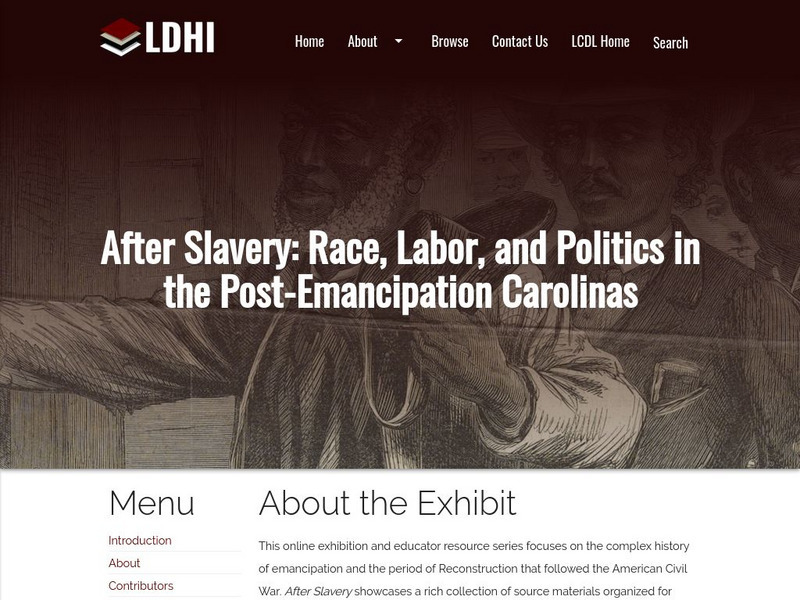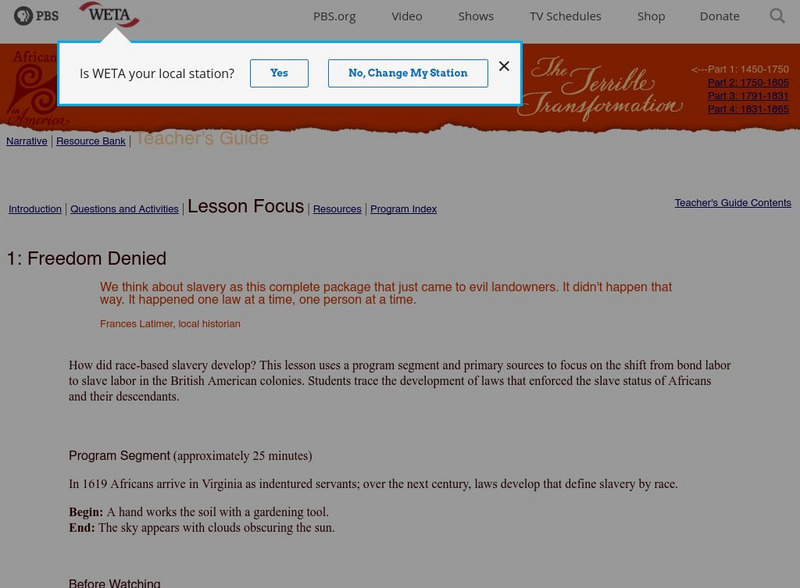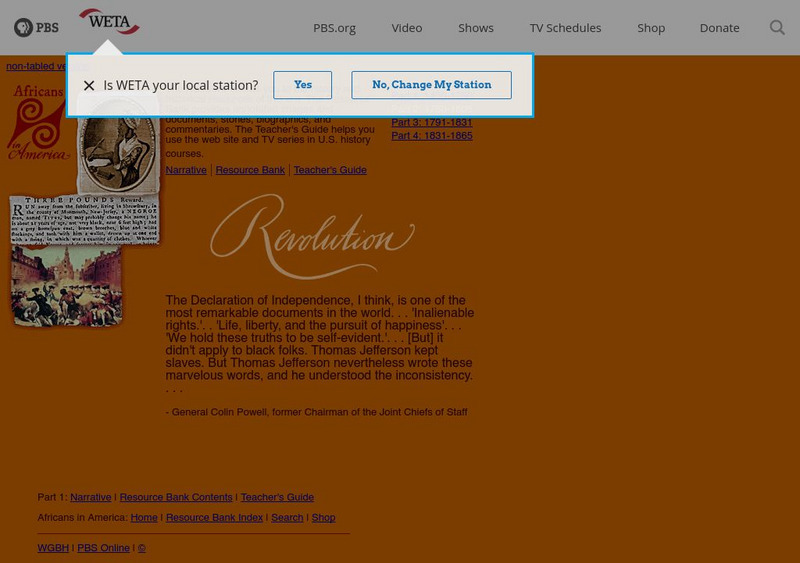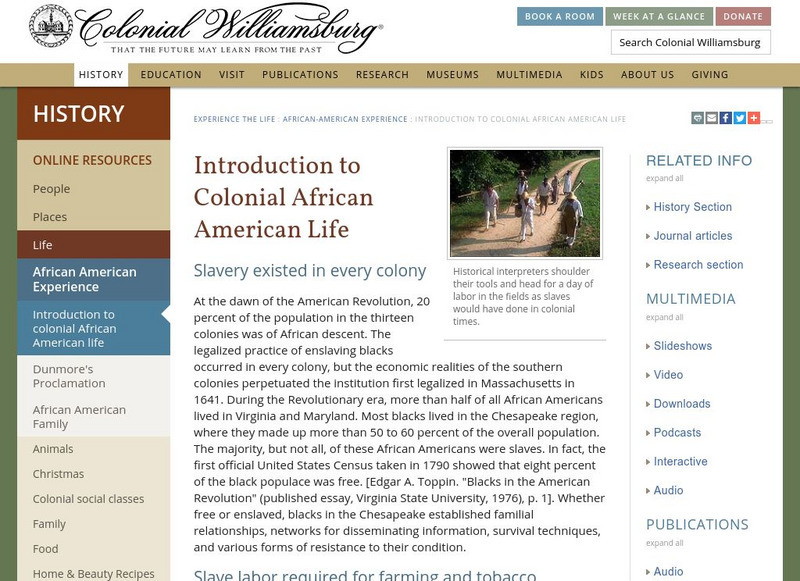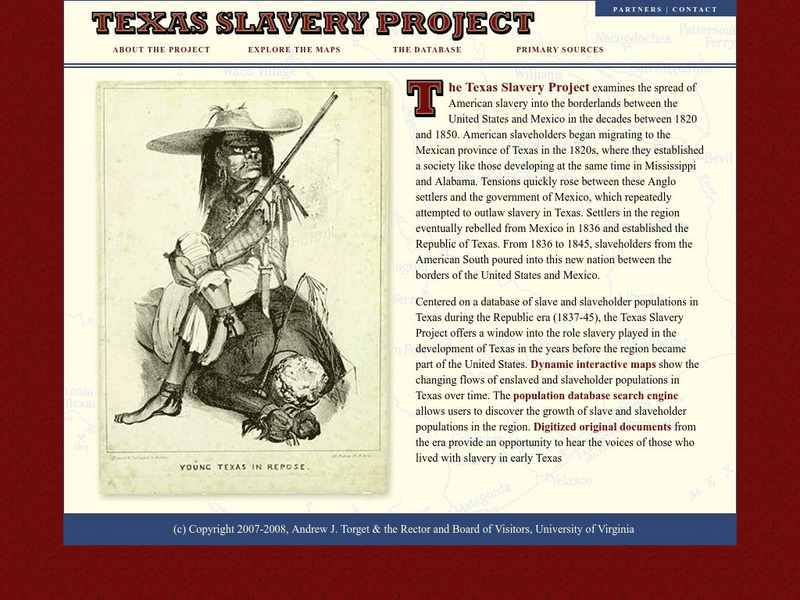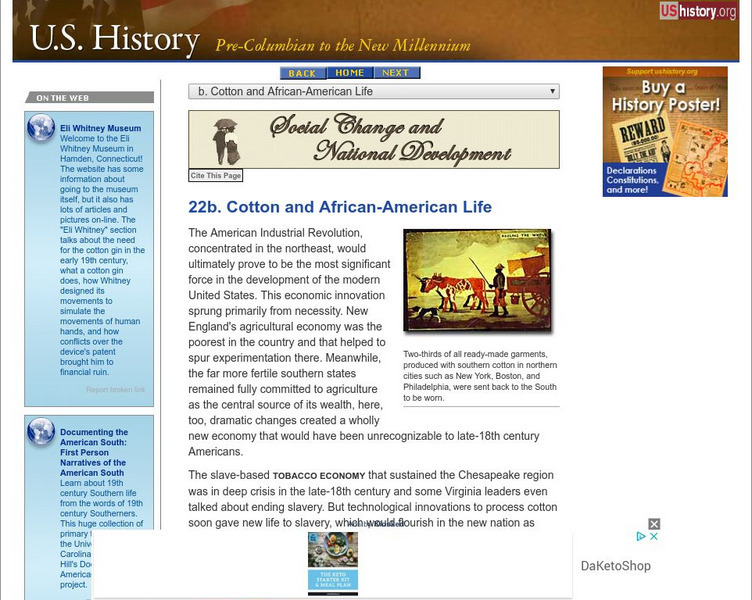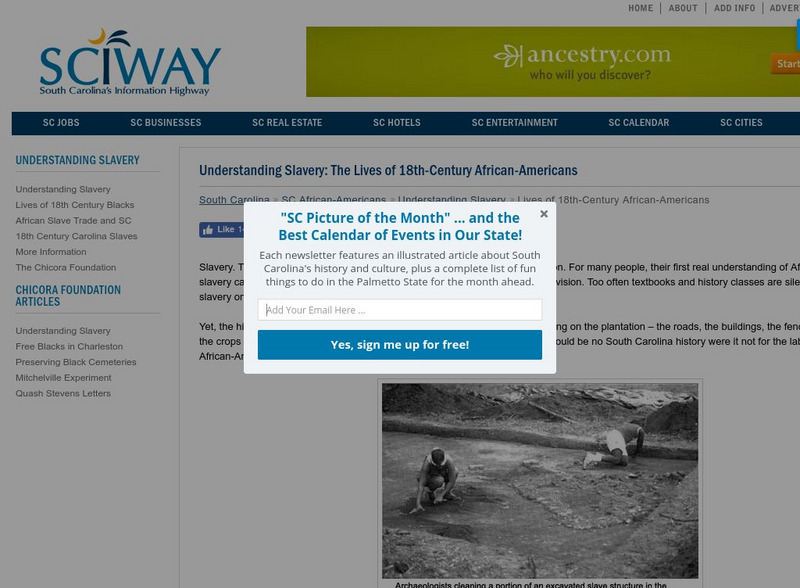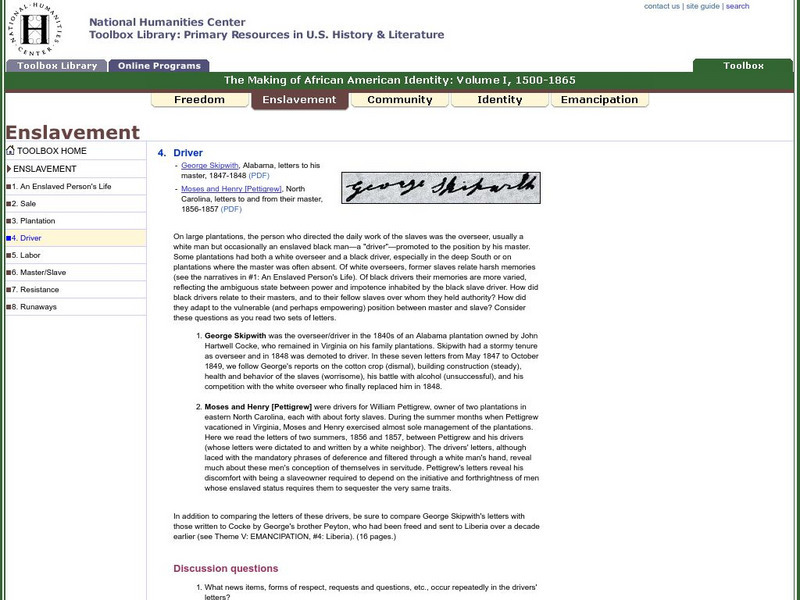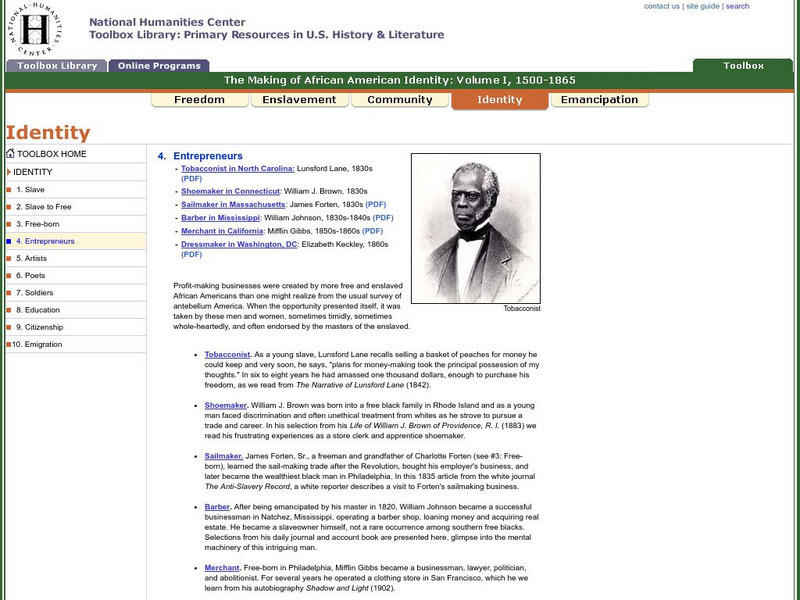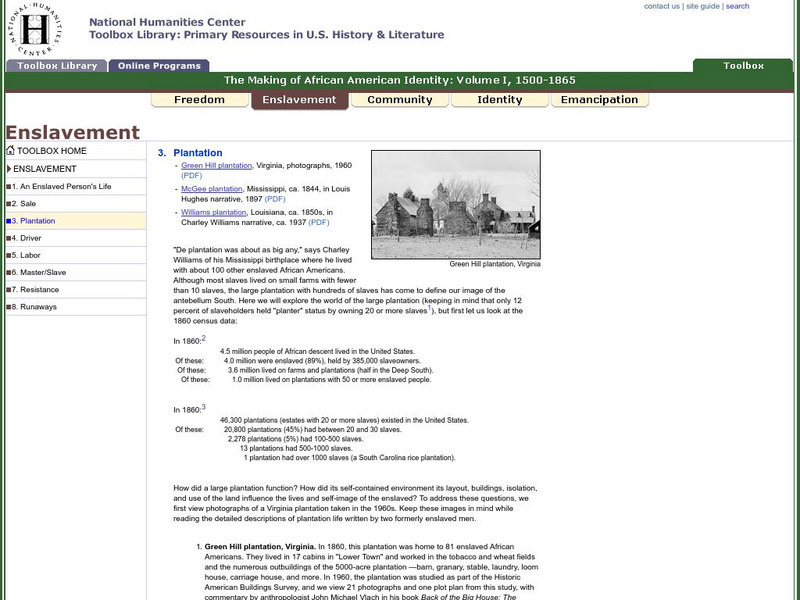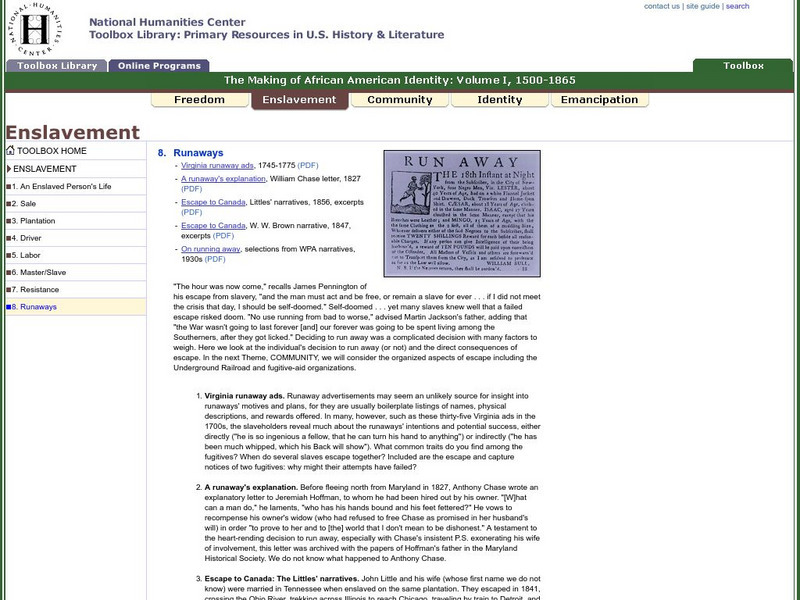Hi, what do you want to do?
Huntington Library
Huntington Library: Slavery: A Crisis in the Making [Pdf]
This lesson looks at the issue of slavery and the role it played in the American Revolution and the founding of the new Republic. Includes background information for the teacher. Students participate in performing a reader's theater...
Other
After Slavery Project: Race, Labor and Politics in Post Emancipation Carolinas
This site is a collaborative work-in-progress involving a team of four scholars based in the US, Ireland and the UK. It consists of ten learning units on topics revolving around the emancipation of slaves in the American South following...
PBS
Pbs: Cet: Africans in America: Teacher's Guide
Go directly to the teacher's guide developed to supplement the PBS documentary "Africans in America," which chronicles the history of slavery in the United States. Find lessons, many of which provide links to related primary sources,...
PBS
Africans in America: Revolution: 1750 1805
Part of a detailed PBS site which describes "the history of racial slavery in the United States, this section focuses on slavery from 1750-1805.
Colonial Williamsburg Foundation
Colonial Williamsburg: Colonial African American Life
Provides a few statistics on slaves in Maryland and Virginia and then contrasts the lives of field hand vs household or urban slaves.
Other
Virginia Center for Digital History: Texas Slavery Project
The Texas Slavery Project takes a deep look at the expansion of slavery in the borderlands between the United States and Mexico in the years between 1837 and 1845.
Texas A&M University
Sons of De Witt Colony Texas: Slavery in Early Texas
This in-depth account of slavery in early Texas shares first-hand information and personal stories to give a true picture of what it was like in Texas the middle of the nineteenth century.
PBS
Pbs: Music, Slavery and the Civil War
This lesson could serve as the basis of a curriculum unit on slavery and/or the Civil War. Spirituals are analyzed, especially their cultural implications.
Library of Congress
Loc: Abolition
This site, which is provided for by the Library of Congress, is part of the African American Mosaic. It describes abolition and gives references to books about the topic.
Independence Hall Association
U.s. History: Cotton and African American Life
But for the invention of the cotton gin, slavery perhaps would have died out in the United States in the early 19th century. Read about why technological advances caused the spread of slavery in the South and read about how slaves clung...
National Humanities Center
National Humanities Center: Teacher Serve: Frederick Douglass and Harriet Jacobs: American Slave Narrators
Lucinda MacKethan, English professor at North Carolina State University, offers a comparison of two classic slave narratives: Frederick Douglass's 1845 Narrative of the Life of Frederick Douglass: an American Slave and Harriet Jacobs's...
Library of Congress
Loc: From Slavery to Civil Rights
This interactive timeline lets students select an era in the history of blacks in United States. Text tells the highlights of the time and primary source materials are linked that pertain as well.
Other
Understanding Slavery: The Lives of Eighteenth Century African Americans
Comprehensive description of slaves in South Carolina. Click on the topics on the left to take you to a wealth of information about the lives of slaves in South Carolina.
Library of Congress
Loc: African American Odyssey: Free Blacks in the Antebellum Period
Online exhibit from the Library of Congress features primary source material about free blacks from the Antebellum Period and teaches about individual accomplishments, emergence of the black church, and documenting freedom.
National Humanities Center
National Humanities Center: Toolbox Library: Slave, Making of African American Identity: V. 1
This resource provides nineteenth-century black narratives that address what it meant to be enslaved and how slaves' identity was formed and changed over time.
Annenberg Foundation
Annenberg Learner: American Passages: Social Realism: Booker T. Washington
Focused on his personal racial and civil philosophy, Booker T. Washington moved mountains making the public aware of the injustices and inequalities of the late nineteenth and early twentieth centuries. Click "Booker T. Washington...
National Humanities Center
National Humanities Center: Toolbox Library: Civil War I: Slaves, Making of African American Identity: V. 1
Photographs of slaves during the Civil War and war memories of former slaves during that conflict. Links to two separate resources can be found here, each focusing on the war memories of former slaves.
National Humanities Center
National Humanities Center: Toolbox Library: Sale, Making of African American Identity: V. 1
Two nineteenth century depictions of the emotional brutality of slave auctions-by an enslaved (formerly free) black man and by former slaves-and several recollections of being sold by former slaves recorded during Depression era...
National Humanities Center
National Humanities Center: Toolbox Library: Driver, Making of African American Identity: V. 1
Unusual letters from black slave drivers, and in one case, letters in reply from the white slave owner, about crops, labor, and conditions on plantations in the mid-1850s.
National Humanities Center
National Humanities Center: Toolbox Library: Community, Making of African American Identity: V. 1, 1500 1865
Twenty nine primary sources-historical documents, literary texts, and visual images-that explore how enslaved individuals and families coped with, adjusted to, maintained communities within, and opposed the system of oppression.
National Humanities Center
National Humanities Center: Toolbox Library: Entrepreneurs, Making of African American Identity: V. 1
Six mid-nineteenth century accounts by free-born black entrepreneurs about their economic activities and struggles. Links to documents describing each trade are provided within this well-developed resource.
National Humanities Center
National Humanities Center: Toolbox Library: Kongo, Making of African American Identity: V. 1
Eight watercolor drawings and an accompanying narrative from an Italian Catholic missionary about the peoples in the Kingdom of Kongo (present-day Angola).
National Humanities Center
National Humanities Center: Toolbox Library: Plantation, Making of African American Identity: V. 1
Numerous photographs of a Virginia plantation (taken in 1960), an autobiographical account of life on a Mississippi plantation from the nineteenth century, and an interview with a former slave about a Louisiana plantation recorded in 1937.
National Humanities Center
National Humanities Center: Toolbox Library: Runaways, Making of African American Identity: V. 1
Several accounts by slaves of running away from bondage, written in the nineteenth century and also recorded in the 1930s, as well as newspaper advertisements seeking information about fugitive slaves in the eighteenth century.





![Huntington Library: Slavery: A Crisis in the Making [Pdf] Lesson Plan Huntington Library: Slavery: A Crisis in the Making [Pdf] Lesson Plan](https://static.lp.lexp.cloud/images/attachment_defaults/resource/large/FPO-knovation.png)
